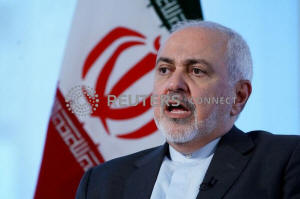|
Iran rejects U.S. accusation it long
violated nuclear deal
 Send a link to a friend
Send a link to a friend
 [July 02, 2019]
DUBAI (Reuters) - Iran rejected on
Tuesday a White House accusation that Tehran was long violating the
terms of its nuclear deal with world powers, after the Islamic Republic
said it had amassed more low-enriched uranium than permitted under the
accord. [July 02, 2019]
DUBAI (Reuters) - Iran rejected on
Tuesday a White House accusation that Tehran was long violating the
terms of its nuclear deal with world powers, after the Islamic Republic
said it had amassed more low-enriched uranium than permitted under the
accord.
"Seriously?" Foreign Minister Mohammad Javad Zarif said in a message on
social network Twitter, after a statement by White House press secretary
Stephanie Grisham that said, "There is little doubt that even before the
dealís existence, Iran was violating its terms."
Tehran's announcement drew a warning from President Donald Trump that
Tehran was "playing with fire."
The move marked Iran's first major step beyond the terms of the pact
since the United States pulled out of it more than a year ago. However,
Zarif said the move was not a violation of the accord, arguing that
Tehran was exercising its right to respond to the U.S. walkout.
The step, however, could have far-reaching consequences for diplomacy at
a time when European countries are trying to pull the United States and
Iran back from confrontation. It comes less than two weeks after Trump
said he ordered air strikes onIran, only to cancel them minutes before
impact.

Iran's semi-official Fars news agency reported that the country's
enriched uranium stockpile has now passed the 300-kg(661 lb) limit
allowed under the deal.
The U.N. nuclear watchdog, the International Atomic Energy Agency (IAEA),
which monitors Iran's nuclear program under the deal, confirmed in
Vienna that Tehran had breached the limit.
Trump, asked if he had a message for Iran, said, "No message to Iran.
They know what they're doing. They know what they're playing with, and I
think they're playing with fire. So, no message to Iran whatsoever."
European powers, which remain party to the accord and have tried to keep
it in place, urged Iran not to take further steps that would violate it.
But they held off on declaring the agreement void or announcing
sanctions of their own.
The White House charge that Iran probably was in violation of the
nuclear deal before and after it was reached in 2015 sharply contrasts
with CIA Director Gina Haspelís testimony in January to the Senate
Intelligence Committee saying, "At the moment, technically, they are in
compliance."
[to top of second column]
|

Iran's Foreign Minister Mohammad Javad Zarif sits for an interview
with Reuters in New York, New York, U.S. April 24, 2019.
REUTERS/Carlo Allegri/File Photo

Daryl Kimball, the executive director of the Arms Control
Association, said the White House charge was "illogical".
He pointed out that at the time the nuclear deal was concluded,
Tehran and the IAEA agreed on a "roadmap" through which Iran is
addressing the nuclear watchdogís unanswered questions about the
nuclear weapons research program that the IAEA and the U.S.
intelligence community assessed ended in 2003.
"The process is still underway," he said.
He also said there was no international standard prohibiting Iran
from enriching uranium, as asserted by Pompeo. "That is not the
case. That is an American position," he said.
The six U.N. Security Council resolutions that Pompeo asserted
established that standard were superseded by Resolution 2231
enshrining the nuclear deal and allowing Iran to enrich uranium
within the agreement's restrictions.
While Iran announced on Monday that it breached the deal's
restriction on storing more than 300 kg (661 lb) of low-enriched
uranium, Kimball said the issue would be adjudicated through the
accordís dispute resolution mechanism.
It was the United States, he said, that first violated the deal when
Trump withdrew from it while Iran still was in compliance and then
re-imposed harsh U.S. sanctions that had been suspended by the
nuclear agreement.
Iranís breach, he said, does not affect the dealís central target of
extending to a year the time in which Iran could "breakout" and
produce enough highly enriched uranium for a warhead.

The breach is a political move aimed at pressuring the European
Union, China and Russia to compensate Iran for the serious damage to
its economy from U.S. sanctions, he said.
(Reporting by Dubai newsroom and Jonathan Landay in Washington)
[© 2019 Thomson Reuters. All rights
reserved.]
Copyright 2019 Reuters. All rights reserved. This material may not be published,
broadcast, rewritten or redistributed.
Thompson Reuters is solely responsible for this content. |